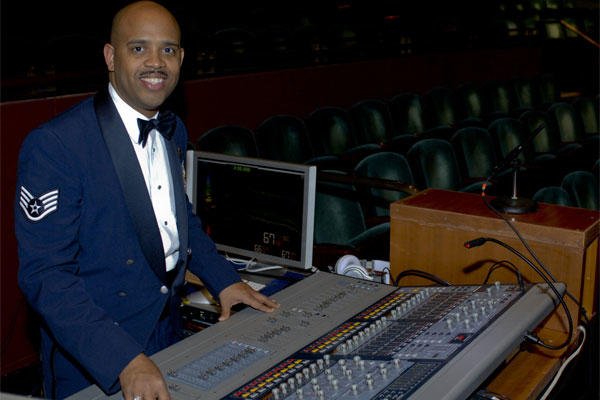LANGLEY AIR FORCE BASE, Va.-- On the Christopher Newport University campus, in Newport News, Va., Ferguson Hall teemed with activity as spectators found their seats. The din of excited chatter filled the room covering the faint sounds of performers warming up and tuning their instruments backstage for the night's event.
As the lights dimmed, the spectators' murmurs died as they shifted attention to the musicians on stage, now poised for the performance.
From the first note of the night to the last decrescendo of the final piece of the U.S Heritage Band of America's winter concert series, Dec. 7, U.S. Air Force Staff Sgt. Kelcey McDonald stood in the crowd.
Stooped over a sound board with hundreds of buttons, knobs and sliders, McDonald slowly moved to the music's beat, listening intently. As the ensemble played, he made minute adjustments to the various controls on the board with a deft precision acquired only after years of experience.
As the U.S. Air Force Heritage of America Band's audio engineer, McDonald ensures the listening experience for all the concert-goers is a pleasant one, whether they sit in the front row or stand in the back.
"In audio, it's essential to have a firm grasp of technical knowledge," he said. "It's more than just technical experience; an audio engineer needs a musician's ear."
Born in East St. Louis, Ill., hometown to Miles Davis and other prominent musicians, McDonald has been training his ears for as long as he can remember.
"My parents found out at a young age that I could sing well," he said. "From then on, they had me sing anywhere I could."
As McDonald grew older, he tired of singing and decided to expand his musical knowledge. By the time he graduated high school, McDonald was an all-state jazz percussionist. His skill gained the attention of music programs across the country, who tried to recruiting him into their performance arts programs.
"I felt like a star football player," McDonald said with a laugh.
When Hampton University in Hampton, Va., offered McDonald a place in their Musical Engineering Technology program, he was excited to find a degree that combined not only his lifelong interest in engineering, but his love for music.
"I hadn't heard a lot about the program," he said. "I rolled the dice, and found my passion in audio engineering."
More than five years later, McDonald graduated from Hampton University with a degree in Music Engineering Technology and a performance arts degree in percussion.
A few years after college, McDonald began working at local open-mic nights, while teaching audio engineering at his alma mater and working for a local news station.
At the age of 29, McDonald was introduced to the prospect of becoming an Airman musician when he struck up a conversation with his neighbor, a U.S. Air Force Heritage of America Band musician.
"The Air Force offered an amazing opportunity," he said. "It gave me the chance to do what I love every day -- while serving my country."
After Basic Military Training, McDonald returned to Langley Air Force Base, Va., and immediately started rehearsing and performing with the band. Even after eight years of service, McDonald still remembers the first concert he took part in, a few short weeks after becoming an Airman.
"It was astonishing to stand in uniform in a room full of people so appreciative of my service," he said with a bright smile. "The impact of my mission didn't click while I was at basic training or my first rehearsals."
On deployments McDonald feels the same surge of pride when playing for his fellow servicemembers, and remembers one concert in particular.
While deployed in Iraq, McDonald and the other Airmen musicians put on a concert in a small venue that held no more than 200 people. Only twenty spectators attended, but the band played with the same gusto as if they were playing for thousands. The Airmen in the audience danced, visibly enjoying the show.
After the concert, McDonald spoke to the Airmen only to find out they lost three brothers-in-arms just the week prior, and had attended the event to relax and find some normalcy in their grief.
"Speaking to those Airmen changed my life," McDonald said, taking a deep breath while remembering that moment. "It's an amazing feeling to help my fellow Airmen, especially in a time of need."
Deployed Airmen musicians not only play for fellow servicemembers, but also for foreign nationals as a way to establish and maintain close bonds.
"Music is a universal language," said McDonald. "It's a great feeling to show locals different aspects of our military -- not just the war fighting."
With the ever-changing landscape of technology, McDonald said he will continue to learn and improve in his field to ensure his fellow musician Airmen convey their message to their best ability.
"I'm excited about what I bring to the fight, and that I have the ability to help people see what the rest of the Air Force does," said McDonald. "I know I'm exactly where I'm meant to be."




























